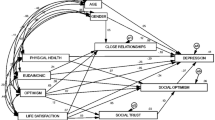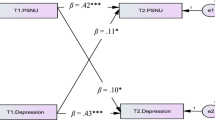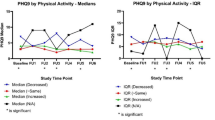Abstract
Social rank theory posits people with depression experience feelings of inferiority in relation to others. These feelings of inferiority and their associated processes in depression bear a striking resemblance to the experience of envy; however, the direction of the association between depression and envy remains unclear. In this study, we investigated the longitudinal associations between dispositional envy and depressive symptoms over six months. Three waves of data were collected through Amazon Mechanical Turk (MTurk) in 2018. A total of n = 644 American community adults (Mage=39.7, SD= 12.8; 41.3 % female) provided responses to study measures at baseline. We performed random-intercept cross-lagged panel models (RI-CLPM) to test the relationships between the variables. The correlations between dispositional envy and depression across three-time points were significant. The cross-lagged analyses revealed that baseline depression (T0) predicted higher dispositional envy at three months (T1), and greater envy at three months predicted higher depression at six months (T2). However, greater envy at baseline (T0) did not predict higher depression at three months later (T1), and higher depression at three months (T1) did not predict greater envy at six months (T2). These results suggest a dynamic and asymmetric relationship between envy and depression over six months. Public health interventions and policy strategies with the goal of reducing depression symptoms should consider the impact of dispositional envy and the environmental context wherein envy is likely (e.g., societal inequality). Future longitudinal studies should assess the relationships between envy and depressive symptoms, considering the potential role of social status.

Similar content being viewed by others
Data availability
The dataset analyzed during the current study are publicly available at the Open Science Framework (https://doi.org/10.17605/OSF.IO/9N8R5).
References
Alicke, M. D., & Zell, E. (2008). Social comparison and envy.
American Psychiatric Association. (1994). Diagnostic and statistical manual of mental disorders: DSM-IV (Vol. 4). American psychiatric association.
American Psychiatric Association. (2013). Diagnostic and statistical manual of mental disorders: DSM-5 (Vol. 10). American psychiatric association.
Beshai, S., Mishra, S., Feeney, J. R., Summerfield, T., Hembroff, C. C., & Krätzig, G. P. (2022). Resilience in the ranks: trait mindfulness and self-compassion buffer the deleterious effects of envy on mental health symptoms among public safety personnel. International journal of environmental research and public health, 19(10), 5926.
Beshai, S., Prentice, J. L., Dobson, K. S., & Nicpon, K. (2014). Gender and attention in depression: Examining the role of modified attention in shifting mood and cognitions. Cognitive Therapy and Research, 38(6), 621–633.
Bühler, J. L., Orth, U., Bleidorn, W., Weber, E., Kretzschmar, A., Scheling, L., & Hopwood, C. J. (2023). Life Events and Personality Change: A Systematic Review and Meta-Analysis. European Journal of Personality, 08902070231190219.
Burt, D. B., Zembar, M. J., & Niederehe, G. (1995). Depression and memory impairment: a meta-analysis of the association, its pattern, and specificity. Psychological bulletin, 117(2), 285.
Buttrick, N. R., & Oishi, S. (2017). The psychological consequences of income inequality. Social and personality psychology compass, 11(3), e12304.
Buunk, B. P., & Brenninkmeyer, V. B. (2000). Social comparison processes among depressed individuals: Evidence for the evolutionary perspective on involuntary subordinate strategies?
Callan, M. J., Shead, N. W., & Olson, J. M. (2011). Personal relative deprivation, delay discounting, and gambling. Journal of personality and social psychology, 101(5), 955.
Daly, T. M., & Nataraajan, R. (2015). Swapping bricks for clicks: Crowdsourcing longitudinal data on Amazon Turk. Journal of Business Research, 68(12), 2603–2609.
Everaert, J., Tierens, M., Uzieblo, K., & Koster, E. H. (2013). The indirect effect of attention bias on memory via interpretation bias: Evidence for the combined cognitive bias hypothesis in subclinical depression. Cognition & emotion, 27(8), 1450–1459.
Fox, J., & Moreland, J. J. (2015). The dark side of social networking sites: An exploration of the relational and psychological stressors associated with Facebook use and affordances. Computers in human behavior, 45, 168–176.
Friedrich, M. J. (2017). Depression is the leading cause of disability around the world. Jama, 317(15), 1517–1517.
Gilbert, P. (2000). The relationship of shame, social anxiety and depression: The role of the evaluation of social rank. Clinical Psychology & Psychotherapy: An International Journal of Theory & Practice, 7(3), 174–189.
Gilbert, P. (2006). Evolution and depression: Issues and implications. Psychological Medicine, 36(3), 287–297.
Gotlib, I. H., & Joormann, J. (2010). Cognition and depression: current status and future directions. Annual review of clinical psychology, 6, 285.
Hamaker, E. L., Kuiper, R. M., & Grasman, R. P. (2015). A critique of the cross-lagged panel model. Psychological methods, 20(1), 102.
Hu, L. T., & Bentler, P. M. (1999). Cutoff criteria for fit indexes in covariance structure analysis: Conventional criteria versus new alternatives. Structural equation modeling: a multidisciplinary journal, 6(1), 1–55.
Jiang, X., & Wang, J. (2020). The causal relationship between envy and depression: A cross-lagged regression analysis. Social Behavior and Personality: an international journal, 48(12), 1–9.
Kessler, R. C. (2012). The costs of depression. Psychiatric Clinics, 35(1), 1–14.
Kroenke, K., & Spitzer, R. L. (2002). The PHQ-9: a new depression diagnostic and severity measure. 32(9), 509-515.
Lang, J., Bliese, P. D., Lang, J. W., & Adler, A. B. (2011). Work gets unfair for the depressed: cross-lagged relations between organizational justice perceptions and depressive symptoms. Journal of applied psychology, 96(3), 602.
Lange, J., & Crusius, J. (2015). Dispositional envy revisited: Unraveling the motivational dynamics of benign and malicious envy. Personality and Social Psychology Bulletin, 41(2), 284–294.
Lim, G. Y., Tam, W. W., Lu, Y., Ho, C. S., Zhang, M. W., & Ho, R. C. (2018). Prevalence of depression in the community from 30 countries between 1994 and 2014. Scientific reports, 8(1), 1–10.
Litman, L., Robinson, J., & Abberbock, T. (2017). TurkPrime. com: A versatile crowdsourcing data acquisition platform for the behavioral sciences. Behavior research methods, 49(2), 433–442.
Little, R. J. (1988). A test of missing completely at random for multivariate data with missing values. Journal of the American statistical Association, 83(404), 1198–1202.
Marmot, M. (2004). Status syndrome. Significance, 1(4), 150–154.
McCullough, M. E., Emmons, R. A., & Tsang, J.-A. (2002). The grateful disposition: a conceptual and empirical topography. Journal of personality and social psychology, 82(1), 112.
Mujcic, R., & Oswald, A. J. (2018). Is envy harmful to a society's psychological health and wellbeing? A longitudinal study of 18,000 adults. Social Science & Medicine, 198, 103–111.
Muthén, L. K., & Muthen, B. (2017). Mplus user's guide: Statistical analysis with latent variables, user's guide. Muthén & Muthén.
Painuly, N., Sharan, P., & Mattoo, S. K. (2005). Relationship of anger and anger attacks with depression. European archives of psychiatry and clinical neuroscience, 255(4), 215–222.
Pan, H., Liu, S., Miao, D., & Yuan, Y. (2018). Sample size determination for mediation analysis of longitudinal data. BMC Medical Research Methodology, 18(1), 1–11.
Roberts, B. W., Walton, K. E., & Viechtbauer, W. (2006). Patterns of mean-level change in personality traits across the life course: a meta-analysis of longitudinal studies. Psychological bulletin, 132(1), 1.
Smith, R. H., Combs, D. J., & Thielke, S. M. (2008). Envy and the challenges to good health.
Smith, R. H., & Kim, S. H. (2007). Comprehending envy. Psychological bulletin, 133(1), 46.
Smith, R. H., Parrott, W. G., Diener, E. F., Hoyle, R. H., & Kim, S. H. (1999). Dispositional envy. Personality and Social Psychology Bulletin, 25(8), 1007–1020.
Smith, R. H., Parrott, W. G., Ozer, D., & Moniz, A. (1994). Subjective injustice and inferiority as predictors of hostile and depressive feelings in envy. Personality and Social Psychology Bulletin, 20(6), 705–711.
Stuart, A. L., Pasco, J. A., Jacka, F. N., Brennan, S. L., Berk, M., & Williams, L. J. (2014). Comparison of self-report and structured clinical interview in the identification of depression. Comprehensive psychiatry, 55(4), 866–869.
Tandoc, E. C., Ferrucci, P., & Duffy, M. (2015). Facebook use, envy, and depression among college students: Is facebooking depressing? Computers in human behavior, 43, 139–146. https://www.sciencedirect.com/science/article/pii/S0747563214005767
Tangney, J. P., & Salovey, P. (1999). Problematic social emotions: Shame, guilt, jealousy, and envy.
Weinberg, J. D., Freese, J., & McElhattan, D. (2014). Comparing data characteristics and results of an online factorial survey between a population-based and a crowdsource-recruited sample. Sociological Science, 1.
Wetherall, K., Robb, K. A., & O'Connor, R. C. (2019). Social rank theory of depression: A systematic review of self-perceptions of social rank and their relationship with depressive symptoms and suicide risk. Journal of affective disorders, 246, 300–319.
Xiang, Y., Dong, X., & Zhao, J. (2020). Effects of envy on depression: The mediating roles of psychological resilience and social support. Psychiatry investigation, 17(6), 547.
Xiang, Y., Wang, W., & Guan, F. (2018). The relationship between child maltreatment and dispositional envy and the mediating effect of self-esteem and social support in young adults. Frontiers in Psychology, 9, 1054.
Zabag, R., Bar-Kalifa, E., Mor, N., & Gilboa-Schechtman, E. (2018). Social anxiety, depression and close relationship: Intra and inter-personal perceptions of social-rank and affiliation. Journal of Social and Clinical Psychology, 37(8), 582–606.
Zhang, R., Peng, X., Song, X., Long, J., Wang, C., Zhang, C., Huang, R., & Lee, T. M. (2022). The prevalence and risk of developing major depression among individuals with subthreshold depression in the general population. Psychological Medicine, 1-10.
Author information
Authors and Affiliations
Corresponding author
Ethics declarations
Ethics approval
Ethical approval was obtained from the Research Ethics Board (REB) of the University of Regina.
Consent to participate
Informed consent was obtained from all participants included in the study.
Conflict of interest
The authors declare that they have no conflict of interest.
Additional information
Publisher’s Note
Springer Nature remains neutral with regard to jurisdictional claims in published maps and institutional affiliations.
Rights and permissions
Springer Nature or its licensor (e.g. a society or other partner) holds exclusive rights to this article under a publishing agreement with the author(s) or other rightsholder(s); author self-archiving of the accepted manuscript version of this article is solely governed by the terms of such publishing agreement and applicable law.
About this article
Cite this article
Mehrabi, F., Iskric, A. & Beshai, S. The temporal association between envy and depression symptoms over 6 months: A Random-Intercept Cross-Lagged Panel Study. Curr Psychol 43, 10122–10131 (2024). https://doi.org/10.1007/s12144-023-05170-3
Accepted:
Published:
Issue Date:
DOI: https://doi.org/10.1007/s12144-023-05170-3




